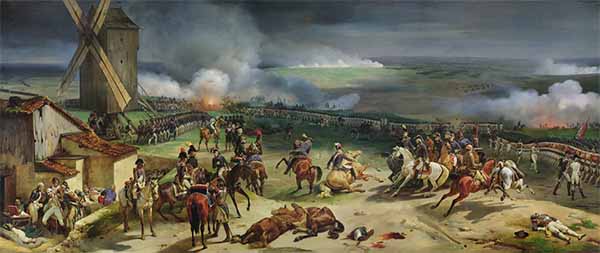The Fake Battle of Valmy During the French Revolution

The revolutionary and republican catechism turned a "simple cannonade" into a glorious victory for the Nation in arms, ignoring a sudden retreat of the enemy that nothing can explain.
Under driving rain, the army of the French Revolution, commanded by Dumouriez and Kellermann, faced this September 20 on the hill of Valmy, near Chalon-sur-Marne, the Prusian and Austrian armies, under the orders of the Duke of Brunswick. After intense artillery fire, which left 300 killed and wounded on the French side and 180 on the opposing side, and while 90,000 men were engaged in the conflict, the Duke of Brunswick, after observing the heights of Valmy with his telescope remarked to those around him: "There are a lot of people up there!" », decides to sound retirement ...
Valmy takes place two months after the proclamation of the homeland in danger. Also this "victory" will be the subject of intense republican propaganda, and Danton, Minister of Justice who had supported the military confrontation with all his weight, triumphed with the Girondins, who had also wanted the war. We know today that Kellermann, decisive by his courage and his audacity, had disobeyed his Minister of War, Servan - who ordered a retreat on the Marne of the whole army -, and decided with Dumouriez to face the enemy army.
Birth of a republican myth
But the major event in this conflict is found in the composition of the French army itself. Indeed, for the first time in the world, 23,000 volunteers joined the regular army, thus forming the first popular army which fought with the cry of « Vive la Nation! » and singing La Marseillaise. This intrusion of the people into the army will be the model for all future nationalist liberations, the symbol of the heroic people in arms saving the endangered homeland. Goethe, who accompanied the Prusian army, noted: "From this place and this day dates a new era in the history of the world. The literary myth was born and began a brilliant career, obscuring the very course of the battle.
However, very quickly, the justification for this sudden retreat would fuel a large number of hypotheses.
Around the Duke of Brunswick
It was especially the personality of the Duke of Brunswick that attracted attention. He had married the sister of George III and was awaiting his daughter's marriage with the heir to the throne of England, the Prince of Wales, who would ascend to the crown in 1794, under the name of George IV. However, an easy victory of the coalition over the French revolutionaries would have ended the war without Great Britain participating in the settlement of French affairs. Another thesis, conveyed by the noble emigrants, denounced a plot of Freemasonry: a secret agreement would have been concluded between Brunswick and Dumouriez, both Freemasons, the entourage of Georges III and some influential Girondins.
The emigres also accused Danton, a notorious Freemason, and the royal power in place, of having bought the betrayal of Brunswick by selling part of the diamonds of the crown of France. Finally, the military capabilities of the latter were called into question. Despite all these explanations, the enigma hovers and the mystery remains unsolved.
A strategic mistake
Contemporary historians favor a more strategic explanation. On the one hand, the European powers would not have taken the French situation seriously, and, on the other hand, they viewed with a good eye the decomposition of the Kingdom of France, which in the 18th century was still the greatest European power. Already, England, mistress of the seas, had recovered its American possessions and the main part of its empire of the Indies by the treaty of Paris, in 1763. The other continental monarchies, which did not appreciate the French monarchy, were not sorry to see France weakening itself in a conflict whose outcome seemed very uncertain. The emigrants would also have misinformed the various courses on the real situation in order to be able to quickly recover their confiscated goods. Nevertheless, the enthusiasm of the volunteers who would prove to Europe their courage and their determination to export revolutionary values should not be minimized.
Louis XVI, winner of the Battle of Valmy ?
Among the hypotheses put forward to explain the orderly retreat of the coalition troops, some have not hesitated to claim that Louis XVI, from his Temple prison, wrote to the King of Prussia and to his brother-in-law the Emperor of Austria, begging them to spare his life and that of his family by not walking in Paris. The recent massacres of September, which saw the sans-culottes indulge in a veritable curse in Parisian prisons, in fact left one to fear the worst. The initiative for this timely intervention would go to three members of the Paris Commune, Pétion, Manuel and Kersaint, who would have placed the market in the hands of the king, promising him in return the lives of him and his family. Dumouriez was reportedly kept informed of the business, which would explain why he did not bother to pursue the Prussians in their retreat.









































































































































































































































































































































